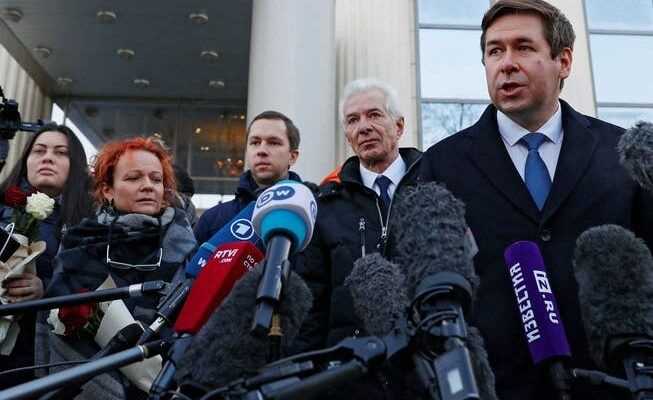The plaintiffs accused the most powerful Russian human rights organization of justifying extremism. With this, the Kremlin wants to get rid of another uncomfortable voice.
The legal representatives of the Human Rights Center Memorial speak to the media after the decision of the Moscow City Court.
One day after the decision on the dissolution of the civil rights organization Memorial, which is concerned with coming to terms with Soviet history, the Russian judiciary ordered the same for its sister organization, the Memorial Human Rights Center. In both proceedings it was only superficially about the alleged disregard of the so-called agent laws and the associated “disregard for the constitution and the rights of the citizens”. The forced dissolution is another drastic sign that the Kremlin no longer tolerates independent institutions that distance themselves from the state.
Dangerous doubts about the judiciary
The lawsuit against the Human Rights Center hid the political motivation even less. In it and in the closing arguments on Wednesday before the Moscow City Court, the Prosecutor General accused the organization of justifying extremist and terrorist ideas. The reason given was the legal support provided by the Human Rights Center to people who had been convicted of “extremists” or “terrorists”, as well as to the Lists of prisonerswho, in the opinion of the organization, were convicted on political or religious grounds. There are currently 352 people on the list of political prisoners with a religious background and 83 on the general list of political prisoners.
The fact that the Human Rights Center classifies those convicted as “extremists” or “terrorists” by the Russian state as political prisoners and thus doubts their lawful conviction is viewed by the plaintiffs’ representatives as disrespect for the judiciary. In doing so, they relied on reports that had been independently described as highly dubious. The legal representatives of the Human Rights Center tried in vain to make it clear that doubts about court judgments and criminal proceedings were not a crime. To this end, they also referred to the successes of their clients before the European Court of Human Rights. From the Kremlin’s point of view, there are in principle no political prisoners in Russia.
Engagement in the North Caucasus
The Human Rights Center Memorial is arguably the most powerful organization still in existence in Russia, which campaigns for the rights of those persecuted by the state and of prisoners. In recent times this has often concerned the now excessively interpreted allegations of “extremism”. The human rights center has always been particularly present in the North Caucasus. This repeatedly brought it into conflict with representatives of the local power elite and the security apparatus.
